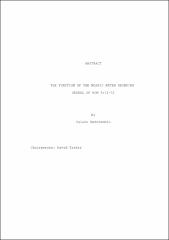| dc.description.abstract | pertaining to its origin, composition,
nature, and purpose. The current study deals with the last
issue, that is, the purpose of the ordeal of Num 5:11-31.
The study addresses the issue through the cognitive social
function approach.
Contrary to the fear, humiliation, abortion, and
metaphorical views that assign the ordeal a negative role,
this dissertation sides with the view assuming that it played
a positive role in the Israelite community by protecting the
accused woman. The study expands this view by suggesting
that the ordeal was a divine ritual that protected not only
the suspected woman but the entire Israelite community.
This stance is based on the analysis of the
involvement of human and divine participants in the ordeal
and the transfer of the case of the suspected woman from the
human sphere to God’s jurisdiction. It follows that the
ordeal of Num 5:11-31 may have mainly functioned,
1. As a socio-community builder which aimed to enhance
relationships among Israelites themselves and with God.
2. As an instrument of God’s judgment which intended to
maintain moral purity in Israelite society.
As such, the ritual communicated some important
messages:
1. An accused person should be considered innocent until
proven guilty.
2. No one should carry out justice for himself.
3. Sensitive issues such as suspicion about adultery need
not to be resolved by violence; they should be referred
to God for He is interested in the stability of the
community and as the supreme arbiter He can penetrate
secrets of human beings and fairly judge the course of
their actions. | en_US |

